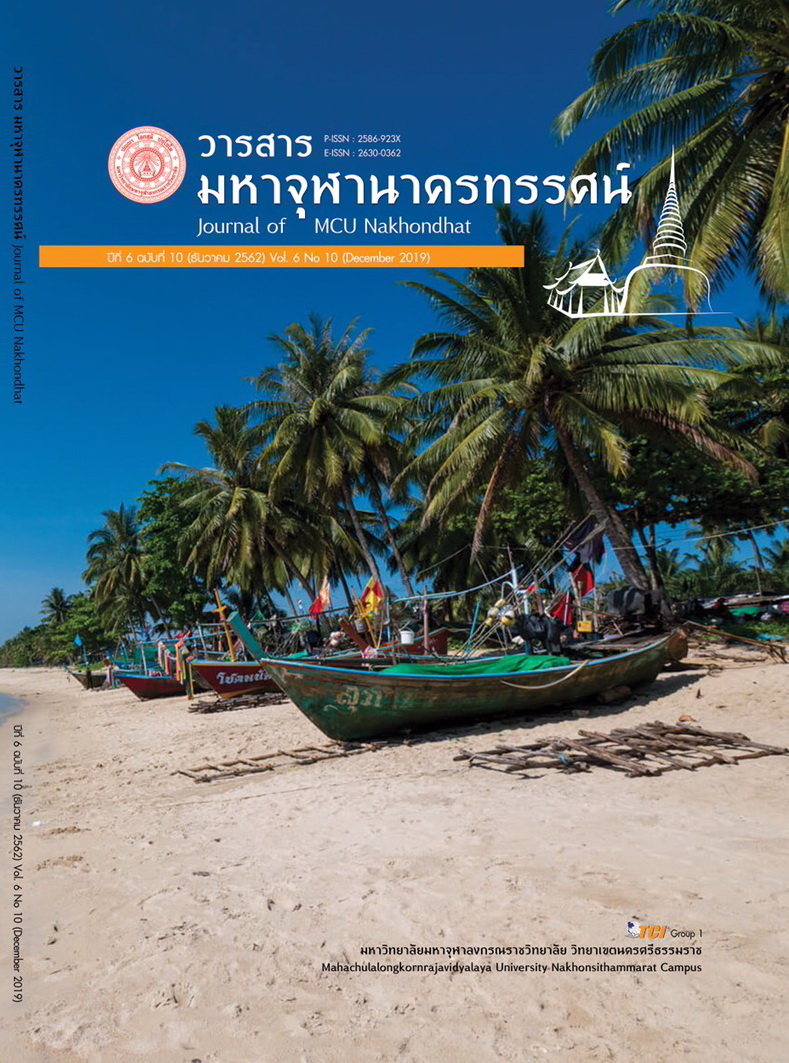STUDY AND DEVELOPMENT OF A TRAINING MODEL BASED ON THREEFOLD TRAINING TO STRENGTHEN ETHICAL LEADERSHIP FOR EXECUTIVE OFFICERS AND TEAM LEADERS IN AN ORGANIZATION
Main Article Content
Abstract
This study was conducted using mixed methods research and the aims of the present study were as follows: 1) to study the Training Model, according to Threefold Training in Buddhism (TMTT) and Ethical leadership (EL); 2) to develop a Training Model according to Threefold Training in Buddhism (TMTT) in order to strengthen Ethical Leadership among executive officers and the team leaders in an organization; and 3) to trial the training model according to Threefold Training in Buddhism (TMTT) before actual use. In this research, the Exploratory Sequential Design was used to divide the study into two phases consecutively. The first phase was qualitative research, while the second phase was quantitative research. The results of this study revealed the following: 1) to study and gain knowledge from TMTT. That separate two parts: the Psychology of Training and Threefold Training in Buddhism were studied to determine ethical leadership from the synthetic concept of Ethical Leadership of Peter G. Northouse and Gary Yukl into three principles of leadership that consisted of self-dominance, people dominance, and work dominance to be the Six Ethical Leaderships that consisted of showing justice, manifesting honesty, respecting others, serving others, the use of the power and influence of leaders and building community; 2) to develop TMTT from in-depth interview the Scholars and Practitioners sum five people and evaluate TMTT from the specialists with a total of five people to be TMTT and consisted of three steps and seven procedures that explained a picture of model of a pagoda; 3) the trial of TMTT with quasi-experimental research revealed that after training with TMTT, the results showed that the average ethical scores of the experimental group was significantly higher than the scores before training at a level of .01.
Article Details
References
ตรัยรักษ์ วรัทย์หินเกิด. (2551). การพัฒนาวินัยในตนเองของนักศึกษา สถาบันการพลศึกษา วิทยาเขตชัยภูมิ ตามแนวทางไตรสิกขา. ใน รายงานการวิจัย. สถาบันการพลศึกษา วิทยาเขตชัยภูมิ.
นภาพร ขันธนภา. (2552). ภาวะผู้นำสามารถสร้างค่านิยมขององค์การและเครือข่ายทางสังคมที่สามารถส่งเสริมพฤติกรรมที่มีจริยธรรม. กรุงเทพมหานคร: พริ้นติ้งพรีเวอร์.
พระธรรมปิฎก (ป.อ.ปยุตฺโต). (2543). พุทธธรรม ฉบับปรับปรุงและขยายความ. พิมพ์ครั้ง 9. กรุงเทพมหานคร: มหาวิทยาลัยมหาจุฬาลงกรณราชวิทยาลัย.
พระธรรมปิฎก (ป.อ.ปยุตฺโต). (2545). พจนานุกรมพุทธศาสตร์ ฉบับประมวลธรรม. กรุงเทพมหานคร: บริษัท สหธรรมิก จำกัด.
พระมหาวุฒิชัย วชิรเมธี (ว.วชิรเมธี). (2552). ภาวะผู้นำ จากเนลสัน มันเดล่า โอบามาแห่ง ทำเนียบขาว. กรุงเทพมหานคร: สถาบันวิมุตตยาลัย.
พิริยะ โม้แพง. (2557). การพัฒนาหลักสูตรฝึกอบรมคุณธรรมจริยธรรมโดยใช้ไตรสิกขาเป็นฐาน สำหรับนักเรียนชั้นประถมศึกษาปีที่ 5. วารสารวิชาการศึกษาศาสตร์, 15(2), 1-12.
สำนักงานคณะกรรมการมาตรฐานการบริหารงานบุคคลส่วนท้องถิ่น. (2562). ผลการสำรวจความคิดเห็นของผู้บริหารส่วนท้องถิ่น (ที่มาจากการเลือกตั้ง) สมาชิกสภาท้องถิ่น ข้าราชการหรือพนักงานส่วนท้องถิ่น และประชาชนผู้รับบริการจากองค์กรปกครองส่วนท้องถิ่น ต่อการปฏิบัติงานของข้าราชการหรือพนักงานส่วนท้องถิ่น. เรียกใช้เมื่อ 6 กรกฎาคม 2562 จาก www.local.moi.go.th/
Gary Yukl. (2010). Leadership in Organization. New Jersey: Prentice Hall.
Northouse, P.G. (2010). Leadership Theory and Practice. 5th ed. Thousand Oaks California: SAGE Publication.


